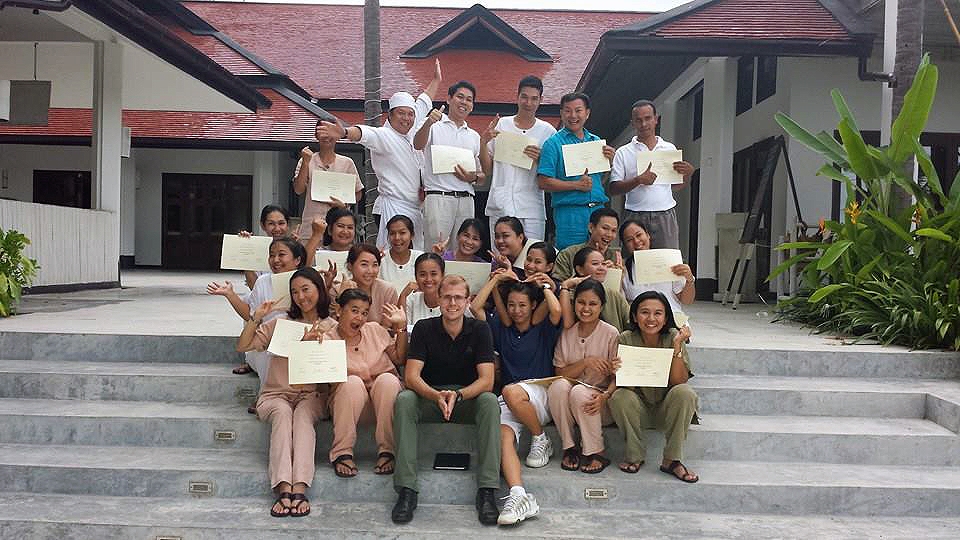- About
- Programs
- Campus life
- Career Services
- Admissions
- News & Events
- Alumni
3 Tips on how to be engaged at work
Secrets to achieving greater job satisfaction.
Are you fully engaged at work? If not, don’t worry. According to a global Gallup poll, 87 percent of people feel the same way. With the recent pandemic limiting travel and changing many work environments, it’s no surprise that many choose to “check out” during their workday, leaving them feeling unfulfilled and with no sense of accomplishment. Delivering interactive training that keeps employees engaged has always been a top priority for Robert Kostecki, who graduated with a Master’s degree in International Business from Swiss Hotel Management School in 2012. He joined the Human Resources and Training department at Six Senses Hotels Resorts Spas in 2014, and develops new projects, conducts interactive trainings, and assists in pre-openings.
One important lesson I have learned during my career is that no two training sessions are ever the same because no two people are the same.
“My desire to go into teaching and training after graduating came as a result of the dull approach of many of my teachers when I was growing up. While students in my class would sleep through the lesson, I would picture different ways of explaining the same subject with an interesting twist. This helped me learn things faster and take ownership of what I studied,” says Robert, who has conducted over 100 training programs for more than 5,000 people around the world. Being engaged at work isn’t just fun and motivating, it also helps you connect to your core strengths and values. He goes on to say that “One important lesson I have learned during my career is that no two training sessions are ever the same because no two people are the same. Finding out what makes someone feel happy at work requires creativity and making sure every person applies their knowledge in a meaningful way.”
Here are his three top tips on how to make your job more engaging so that you feel a sense of accomplishment at the end of each day:
1. Exercise your strengths
“During one of my classes while studying my Masters we all did an assessment that identified our strengths. I took that lesson to heart and apply it to my trainings,” Robert notes. Those who feel actively engaged at work have tasks that align with their core strengths and personal values. “For example, one of my strengths is the desire to constantly learn, so any task that requires learning something new, I put up my hand first!”
But what can you do when your tasks don’t match your strengths? Robert recommends re-crafting the job to suit you better, whether that relates to the task itself, your relationships with colleagues, or your thinking. “Ask yourself how you can tailor a boring task to leverage your strengths. For example, if you are detail-oriented, take on more operational tasks or spend time sharing your input.”
When the pandemic hit, many employees had to take on new responsibilities to support operations, says Robert. For many people, these responsibilities brought new stressors which made work less engaging. One technique Robert introduced was helping them think about things differently. “For example, I helped a colleague reframe his thinking from, ‘I now brew coffee’ to ‘I make something that brings people joy and gives them energy’."
If you are unclear about what your strengths are, Robert recommends taking Gallup’s Top Five Strengths assessment. The helpful insights you will gain are worth the small fee.
2. Celebrate small wins
“Just like each project and report in school contributes to your final grade, the progress you make each day at work contributes to your feeling of engagement,” says Robert. One training activity Robert uses is asking employees to identify a few small wins that made them feel good in the last 24 hours. “I explain that while small setbacks tend to dominate our perception of the day, we often don’t take time to celebrate small wins.” Even small, incremental progress can increase engagement and provide a sense of satisfaction.
Whether it is finishing a task on schedule or a colleague being receptive to your innovative idea, Robert says “focusing on the headway you make promotes positive emotions and fuels engagement”. Celebrating small wins outside of your work environment can also provide happiness and gratification in life.
3. Create moments of ‘flow’
“During my time at Swiss Hotel Management School, the lecturers always stressed the importance of creativity. I remember designing restaurant concepts and guerilla marketing strategies, but it wasn’t until I got to apply that creativity in real-life situations that I realized its value,” says Robert.
Robert claims that core to his training sessions on achieving engagement at work is the state-of-mind concept of Flow:“This occurs when a person is completely immersed in an activity. If you have ever worked on something, lost all sense of time, and forgotten about the outside world, chances are, you just experienced ‘flow’.”
He states that ‘flow’ is magical in the workplace because when we love what we do, we feel invigorated, in control, and appropriately challenged. He advises striving for moments of ‘flow’ by finding tasks that require full concentration and working on them when your energy is at its highest. “Achieving flow is not always easy, and it may take time to find the right environment or the right task. However, with practice, anyone can achieve ‘flow’ and significantly increase their overall engagement at work,” says Robert.
About Robert Kostecki
Robert Kostecki is a Group Training & Projects Manager at Six Senses Hotels Resorts Spas who is passionate about expanding the borders of education in the hospitality industry. From working in kitchens, delivering trainings around the world, and even being a part-time DJ, he never forgets and loves that in hospitality – no two days are ever the same.
#Alumni



















